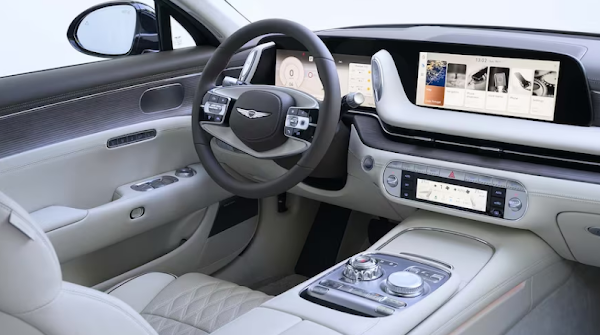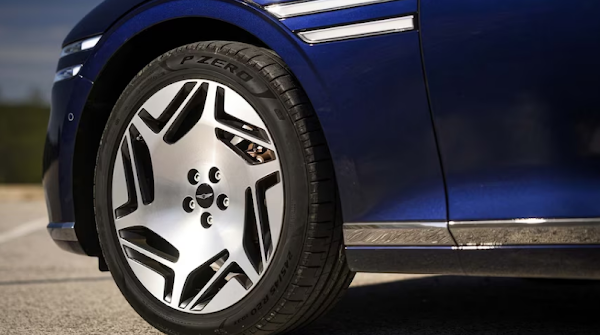
You need a certain chutzpah to take on the Mercedes-Benz S-Class on its home turf. But, as we've seen with vehicles like the Hyundai Ioniq 6 and the Kia EV9, Hyundai Motor Company doesn't lack confidence. So, the decision to launch its updated 2024 Genesis G90 sedan—the flagship of its high-style luxury brand—in Germany and Switzerland perhaps shouldn't come as a surprise.
We like the Genesis G90—a lot. Its sparkling, sophisticated design and customer-focused luxury technology helped make it our 2023 Car of the Year. "I believe it to be the best luxury car on the market, regardless of price," longtime guest judge Chris Theodore said. "Does this rewrite the executive limo rulebook?" associate editor Billy Rehbock asked. "It does."
What's New For 2024? More Than You'd Think
The G90 gets a handful of tweaks for the 2024 model year. Animated exterior welcome lighting, power-operated second-row doors, and Wi-Fi hotspot functionality are now standard. The engine sound enhancement system has been retuned, and an engine oil level sensor has been added to the suite of electronic watchdogs. Buyers can now have their G90's keys color-matched to their car's exterior paint.
Those upgrades enhance a car we reckon offers American consumers a value-packed alternative to the Mercedes-Benz S-Class. As deputy editor Alex Stoklosa opined at COTY: "Mercedes has absolutely owned the luxury full-size sedan class for decades, so for Genesis to … break through with something as polished, as compelling, yet somehow unique from the S-Class is stunning." But will German and Swiss customers think the same way?
Genesis has worked hard on finessing the G90's spec in a bid to win them over. The car is only available with the top-spec, 409-hp e-supercharged version of the 3.5-liter V-6. It also comes standard with air suspension, all-wheel drive, and rear-wheel steering, as well as the ultra-luxe two-passenger rear-seat configuration and active noise cancelling.
Engineers have also made changes to help the G90 cope better with Europe's high-speed highways. These include fine-tuning the variable ratio EPAS system along with the hardware and software of the rear-wheel steering to improve stability at autobahn speeds—all while retaining agility through the twisties, changing suspension bushes to improve chassis response, and recalibrating the software for the adaptive shocks and multi-chamber air suspension.
Given all that standard equipment, customers basically only need to decide which of the 10 exterior shades, five interior colorways, and six interior garnishes they prefer. Oh, and unlike their American counterparts, they can choose between the standard-
wheelbase model we get, and the Long Wheelbase version hitherto available only in Korea. We recently had the opportunity to sample both in southern Portugal.

How Much Have The Updates Paid Off?
In terms of ride/handling compromise, the standard-wheelbase car is the nicer of the two G90s. It feels more composed and yet more agile on the back roads, and just as smooth at speed on the freeways and while trundling through village back streets. The G90 Long Wheelbase car, which boasts and extra 7.5 inches more between the axles, is better in terms of pitch motions, but you can feel more non-linearity in its lateral responses, the rear-wheel-steering system noticeably kicking the rear end around tight corners.
At a reported 5,081 pounds, the standard-wheelbase G90 is no featherweight, and the bigger Genesis weighs 364 pounds more. You can feel it. According to the official performance numbers from Genesis, the G90 Long Wheelbase is just two-tenths of a second slower to 60 mph, but what the numbers don't describe is how much harder the 3.5-liter e-supercharged V-6 appears to work to keep the bigger car on the pace. It doesn't help that the eight-speed automatic transmission could be more decisive in terms of both upshifts and downshifts.

In terms of the way it drives, the G90 can't match the quiet performance and calm composure of the Mercedes-Benz S-Class. The 3.0-liter inline-six powering the U.S. market's entry-level S500 4Matic doesn't have quite the same torque as the e-supercharged Genesis V-6 (384 lb-ft versus 404 lb-ft), but it silkily punches out 20 more horsepower and drives through a nine-speed automatic transmission that's smoother and more responsive than the eight-speeder in the Genesis. That, plus the fact it weighs 440 pounds less than the standard-wheelbase G90, means the Mercedes feels more effortless and refined.
 Where the G90 does give the German car a run for its money, however, is in the interior. The flagship Genesis looks, feels, and functions like a proper top-end luxury sedan from the moment you open the door—especially so for a car that in the U.S. retails for three-quarters the price of a similarly equipped S500 4Matic. That said, the G90's seating isn't quite as accomplished as that of the Mercedes: The H-point for front-seat passengers is higher, making you feel as if you're riding on the car rather than in it, and the rear-seat squab isn't quite as plush.
Where the G90 does give the German car a run for its money, however, is in the interior. The flagship Genesis looks, feels, and functions like a proper top-end luxury sedan from the moment you open the door—especially so for a car that in the U.S. retails for three-quarters the price of a similarly equipped S500 4Matic. That said, the G90's seating isn't quite as accomplished as that of the Mercedes: The H-point for front-seat passengers is higher, making you feel as if you're riding on the car rather than in it, and the rear-seat squab isn't quite as plush.
The G90 Is A Threat, But Not An Existential One
The 1990 Lexus LS400 scared the living daylights out of Mercedes-Benz. Such was the Japanese car's smoothness, refinement, and build quality, that shocked engineers in Stuttgart were forced to delay the launch of the W140 S-Class and make hurried revisions to ensure it was competitive. A quarter century later, Korea's S-Class rival is a much more subtle threat.
Toyota didn't really understand the potential of the Lexus LS400. It had built a luxury car that rivaled Europe's best, but it failed to capitalize on the potential it unlocked, to the point where it could be argued today that Lexus has failed to become a global luxury brand.
The S-Class still owns the large luxury sedan segment. Sales in the U.S. last year reached 14,098 units, almost twice the number of its nearest rival, BMW's 7 Series. With just 1,381 G90s sold stateside in 2023, you could say Hyundai has some catching up to do. But in the context of Audi's A8 (2,341 sold in 2023) and the current Lexus LS (2,367 sold), the Genesis brand is in the game.

More important, Hyundai seems committed to making it a long game. Genesis Motor Europe managing director Lawrence Hamilton insists Genesis cannot be a credible player in the luxury segment without a large sedan. "The G90 demonstrates our ambition to be in Europe and to succeed," he said of the decision to launch the car in the three-pointed star's back yard. And underscoring that ambition is sharp pricing: Both Genesis G90 models will retail in Germany for at least 20 percent less than heavily optioned S-Class counterparts that still can't match their levels of standard equipment.
Although it has a commanding road presence and a truly opulent interior, in terms of overall performance and efficiency, not to mention all-round ride and handling, the Genesis G90 isn't ultimately a better luxury car than the Mercedes-Benz S-Class. But German and Swiss consumers are known for their careful and rational approach to deciding what their next new car will be. And Hyundai is betting they can't resist a bargain.
2024 Genesis G90
Price $99,795
Layout Front-engine, AWD, 4/5-pass, 4-door sedan
Engine 3.5L/409-hp/405-lb-ft twin-turbo and elec supercharged port- and direct-injected DOHC 24-valve 60-degree V-6











